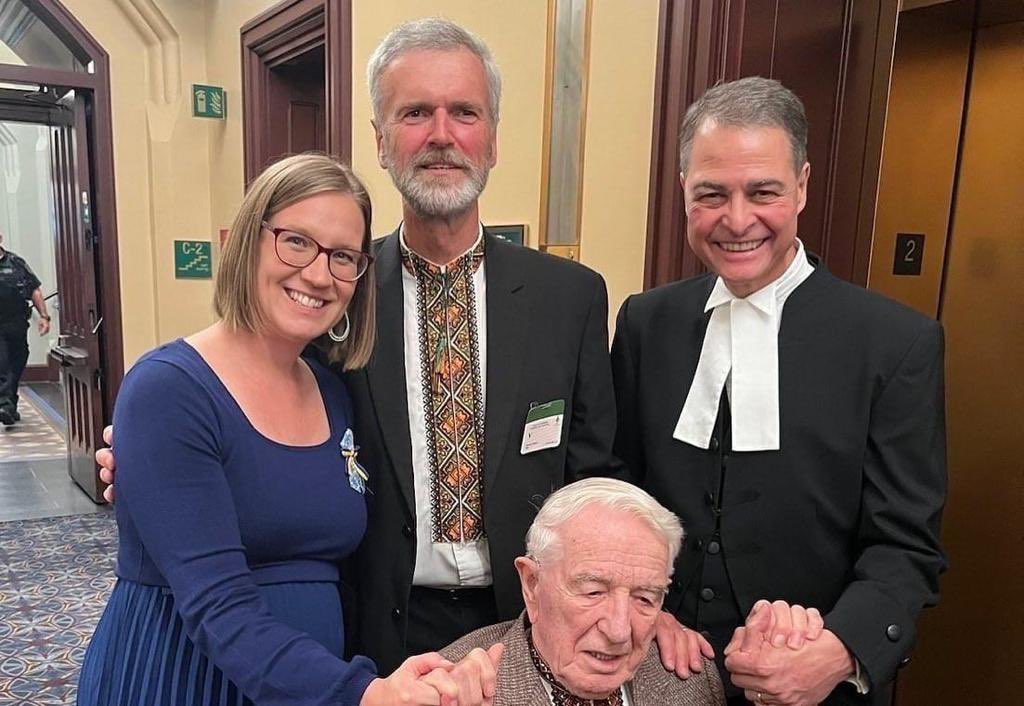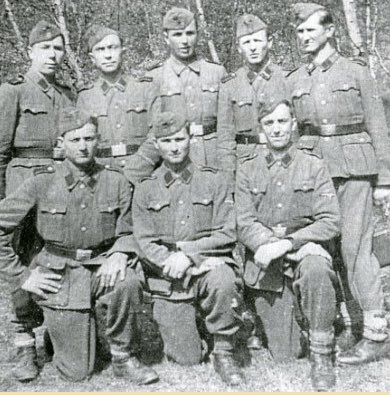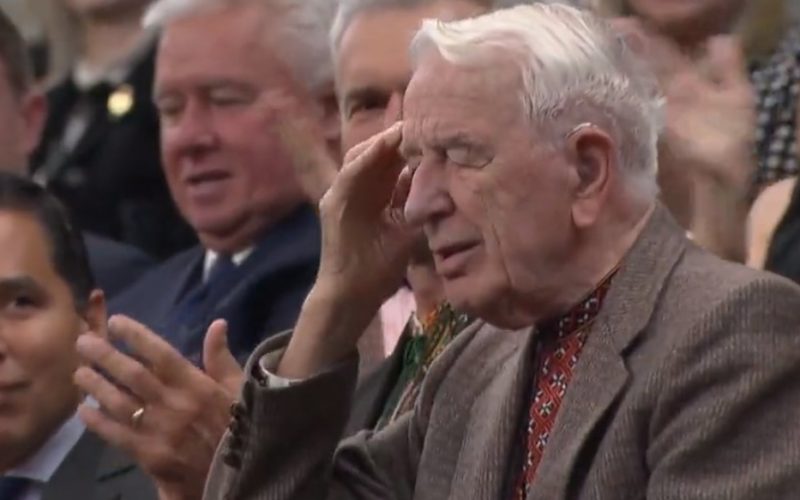Article by Euheniia Martyniuk and Bohdan Ben
Row in Canada over Nazi accusations against Ukrainian WWII veteran Yaroslav Hunka
The 98-year-old WWII veteran Yaroslav Hunka was invited to the Parliament of Canada, where Ukrainian President Zelensky spoke on 22 September. Hunka traveled to Ottawa from North Bay, Ontario, which is nearly a 5-hour drive by car.

In the Parliament of Canada, Speaker Anthony Rota referred to Yaroslav Hunka as a “hero,” the entire chamber greeted him with a standing ovation. Prime Minister Justin Trudeau was in Parliament with President Zelensky at that time.
“He is a Ukrainian hero and a Canadian hero, and we thank him for all his service. [Hunka] fought for Ukrainian independence against the Russian aggressors then and continues to support the troops today,” Mr. Rota said.
Later the local Jewish organization CIJA (Centre for Israel and Jewish Affairs) accused Hunka of being a Nazi who participated in the genocide of Jews.
“We are deeply troubled and disturbed that a Ukrainian veteran of the infamous 14th Waffen Grenadier Division of the Nazi SS – which actively participated in the genocide of Jews – was celebrated with a standing ovation in the Canadian Parliament,” CIJA stated.
This led to a political scandal in Canada, ultimately prompting an apology from the Speaker of Canada’s House of Commons.
“I have subsequently become aware of more information which causes me to regret my decision to do so… I particularly want to extend my deepest apologies to Jewish communities in Canada and around the world,” Anthony Rota said in a statement shared by his office.
So, what was the Ukrainian Yaroslav Hunka doing during WWII?
Hunka, originally from the village of Urman in Ternopil Oblast, served in the 14th Waffen-SS Grenadier Division “Galicia” during WWII. This division was formed on 28 April 1943 and consisted mainly of volunteer ethnic Ukrainians operating under German command.
The unit was renamed the First Ukrainian Division of the Ukrainian National Army before surrendering to the Western Allies in 1945.

Did the division take part in Nazi crimes?
Historical accounts indicate that most Ukrainians who joined the First Ukrainian Division during World War II were not motivated by a desire to assist Hitler and the Nazis in conquest and genocide. Instead, these Ukrainians saw the division as an opportunity to resist Russian imperialism and try to establish an independent Ukrainian state free from Soviet domination.
The majority of division recruits came from the Ukrainian region of Galicia, which shared its name. Prior to 1939, Galicia was part of Poland and had relative cultural autonomy. In 1939, the Soviet Union occupied Galicia, leading to mass killings and repression. Thus, when the Germans first arrived in Galicia, many locals saw it as a chance to free themselves from Soviet occupation.
While the division did fight under overall Nazi command, Ukrainian recruits objected to its genocidal policies, even if they felt compelled to ally with Germany militarily to achieve Ukrainian self-determination.
“They [the soldiers of the First Ukrainian Division] identified with the fight for an independent Ukraine. In 1943, [when they joined forces with Nazi Germany], the world was still unaware of the full extent of Nazi’s atrocities. Only later, when the Western Allies entered the Nazi concentration camps in 1945, the world discovered the full extent of Hitler’s crimes,” noted Ukrainian historian Mykola Posivnych.
Although soldiers of the First Ukrainian Division faced accusations of killing civilian Poles and Jews, the Nuremberg Tribunal did not find the unit guilty of any war crimes.
Furthermore, Canada initiated an independent investigation into the alleged presence of Nazi war criminals who had immigrated to Canada after World War II. In 1985, the government established the Commission of Inquiry on War Criminals in Canada, commonly known as the Deschênes Commission, to investigate these allegations. The Commission conducted extensive hearings over nearly two years, interviewing witnesses and reviewing evidence. Ultimately, the Deschênes Commission concluded that none of the members of the First Ukrainian Division who had settled in Canada were found guilty of committing war crimes during their service in World War II.
So, when the CIJA organization accused the Ukrainian veteran of involvement in the Holocaust, it would have been good to provide some evidence. While individual experiences in wartime can significantly differ, accusations of participating in something as horrific as the Holocaust require substantive proof. It should be thoroughly examined if CIJA has credible documentation or testimony indicating Yaroslav Hunka’s involvement. However, unsubstantiated charges risk unfairly tarnishing a person’s reputation.
The complexities of World War II extend beyond a simplistic good versus evil narrative. Ukraine did not exist as an independent state, and many Ukrainians saw the turmoil of war as an opportunity for self-governance. However, competing visions divided pro-independence groups. Ukrainians had difficult choices and clashing perspectives during the war. Some welcomed the Nazis as liberators, while others continued supporting the Soviet war effort. By war’s end, some Ukrainians had collaborated with the Nazis, others joined the Soviet resistance.
While the glorification of Hunka may be a dubious or exaggerated step, even more groundless is an accusation of him as a Nazi, given that soldiers like him were motivated to prevent further Soviet atrocities in Ukraine, which still remain overlooked by historians today.
Read more:




